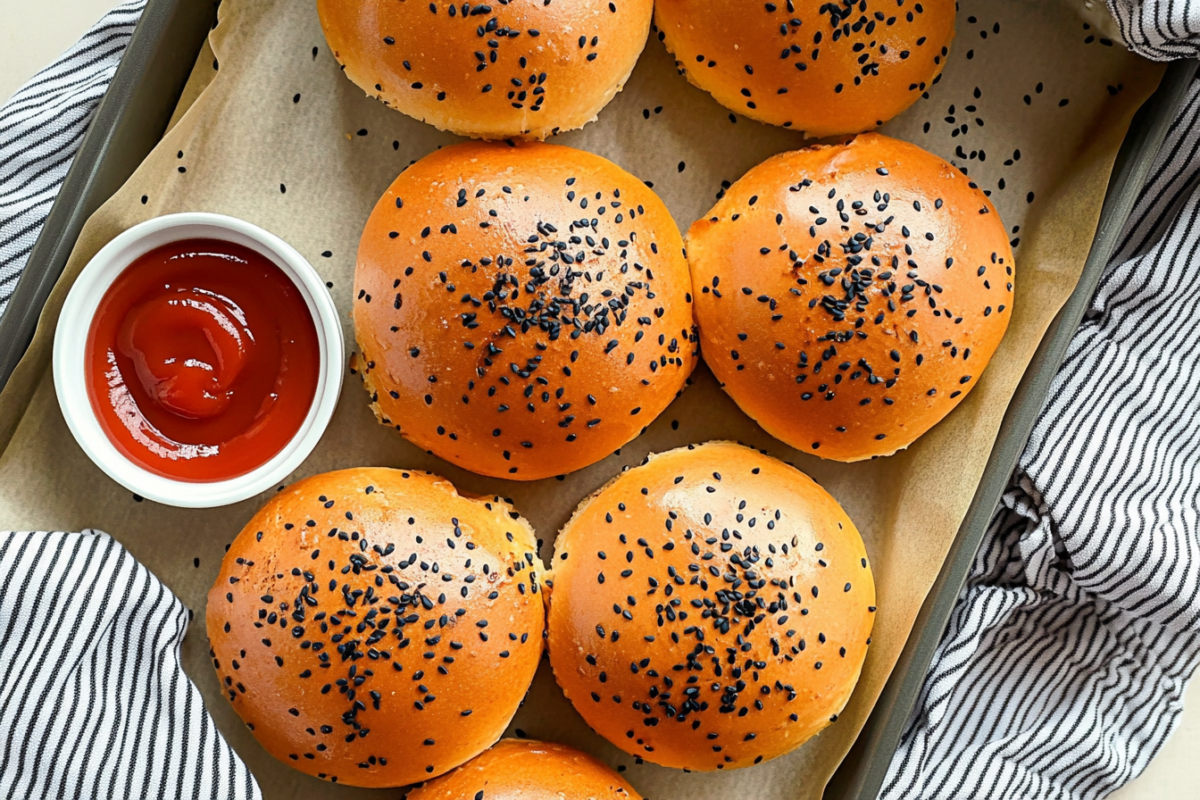Sourdough Discard Hamburger Buns: A Complete Guide
Using sourdough discard to create delicious, fluffy hamburger buns isn’t just a trend—it’s a perfect blend of sustainability and flavor. If you’re one of the many who maintains a sourdough starter, you know the dilemma of discarding. Instead of tossing it, why not transform it into golden, soft buns that elevate your burgers to a gourmet level? In this guide, we’ll explore Everything from what sourdough discard hamburger buns are to the step-by-step recipe and tips for freezing, reheating, and customizing. So, let’s get started!
Table of Contents
What Are Sourdough Discard Hamburger Buns?
Sourdough discard hamburger buns are a creative way to use the leftover starter that typically gets thrown away during the feeding process. This discard still contains plenty of tangy flavor and nutritional benefits, making it an ideal ingredient for enhancing basic bread recipes. When combined with other simple ingredients, sourdough discard produces buns that are tender, slightly chewy, and packed with rich flavor.
These buns also provide a sustainable option for home bakers. Instead of wasting perfectly good discard, you can make something that brings people together—because who doesn’t love a good burger night? They’re incredibly versatile, perfect for savory and sweet fillings.
Benefits of Using Sourdough Discard
The advantages of using sourdough discard extend beyond just reducing waste. From the health benefits to the unique taste profile, there’s so much to love about incorporating it into your baking routine.
The Unique Flavor Profile
Sourdough discard lends a tangy and slightly nutty flavor that elevates the taste of standard hamburger buns. This subtle complexity pairs beautifully with various toppings, from juicy patties to grilled vegetables. It’s like giving your bread a personality boost!
Reducing Food Waste with Sourdough
Let’s face it—wasting food doesn’t feel good. Using sourdough discard minimizes waste and gives you the satisfaction of creating something remarkable from what would otherwise be thrown away. It’s a win-win for your kitchen and the environment.
For more insights into sourdough’s unique characteristics, visit The Science of Baking with Sourdough.
Ingredients for Sourdough Discard Hamburger Buns
To make the perfect sourdough discard hamburger buns, it’s essential to start with the right ingredients. Each component is critical in achieving the soft texture, golden crust, and unforgettable flavor that elevate these buns.
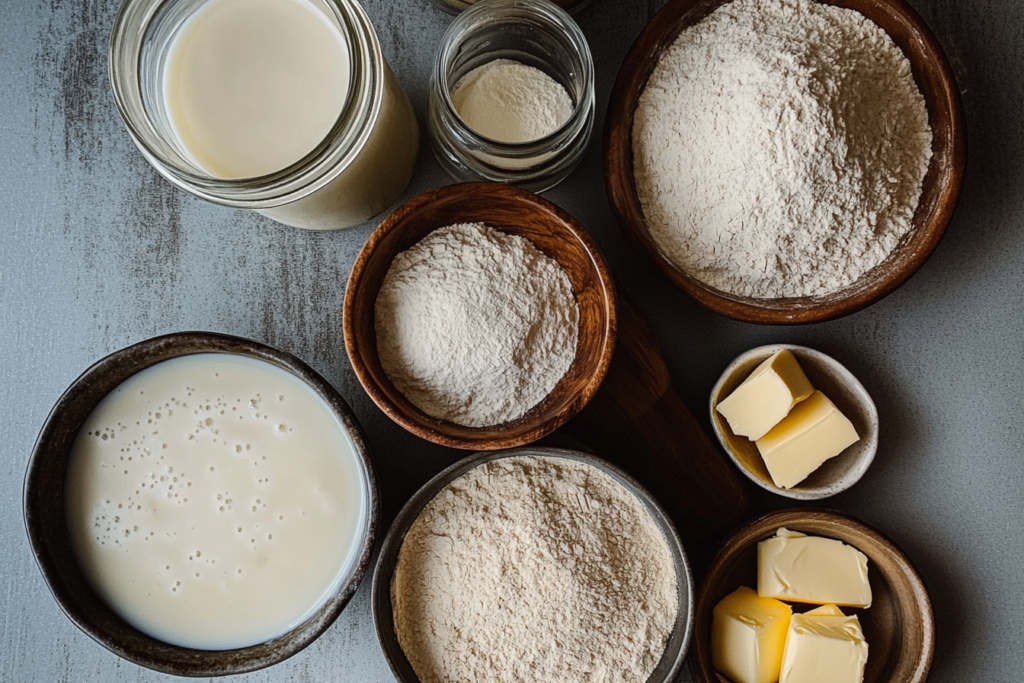
Sourdough Discard: Key Ingredient
The star of the show, sourdough discard, brings a tangy flavor and moist texture to your buns. It’s important to use fresh discard, ideally from the past few days, to balance flavor and activity. The discard acts as a natural flavor enhancer, delivering a slightly acidic note that perfectly complements the sweetness in the dough.
Flour Selection: All-Purpose vs. Bread Flour
The type of flour you use will influence the texture of your buns. With its higher protein content, bread flour creates a chewier, sturdier bun that holds up well to heavy toppings. On the other hand, all-purpose flour yields a softer, fluffier bun, making it a great option for those who prefer a more delicate texture.
For a compromise, you can mix the two flours to achieve a balanced, soft, and structurally sound consistency.
Essential Additives: Yeast, Sugar, and Salt
While sourdough discard contributes some natural yeast, adding a small amount of commercial yeast ensures the buns rise predictably and quickly. Sugar sweetens the dough and helps with browning, while salt enhances flavor and strengthens the dough structure.
Step-by-Step Recipe for Sourdough Discard Hamburger Buns
Let’s dive into the process of making sourdough discard hamburger buns. With a few simple steps, you can create buns that are soft, flavorful, and perfect for any occasion.
Preparing the Dough
- Combine Ingredients: In a large mixing bowl, combine your sourdough discard, flour (all-purpose or bread), a teaspoon of yeast, sugar, salt, warm water, and a splash of milk for added richness. Mix until the ingredients form a shaggy dough.
- Knead the Dough: Turn the dough onto a floured surface and knead for 8–10 minutes until it becomes smooth and elastic. Alternatively, use a stand mixer with a dough hook attachment to save time and effort.
- Initial Rise: Place the dough in a lightly oiled bowl, cover it with a damp cloth, and let it rise in a warm spot for about 1–2 hours or until it has doubled.
Shaping and Proofing
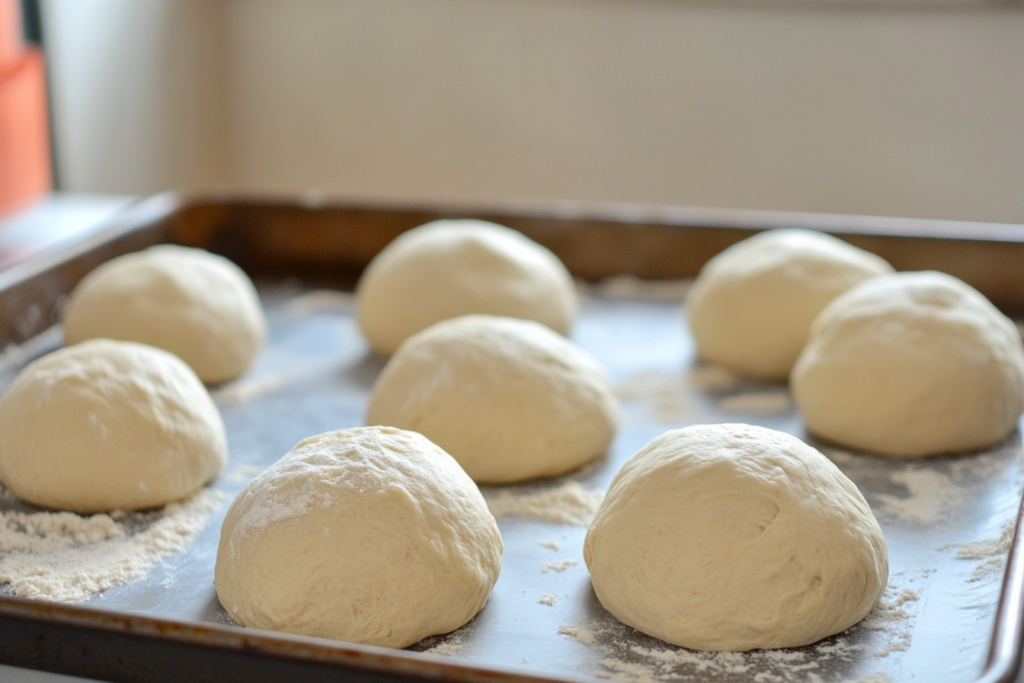
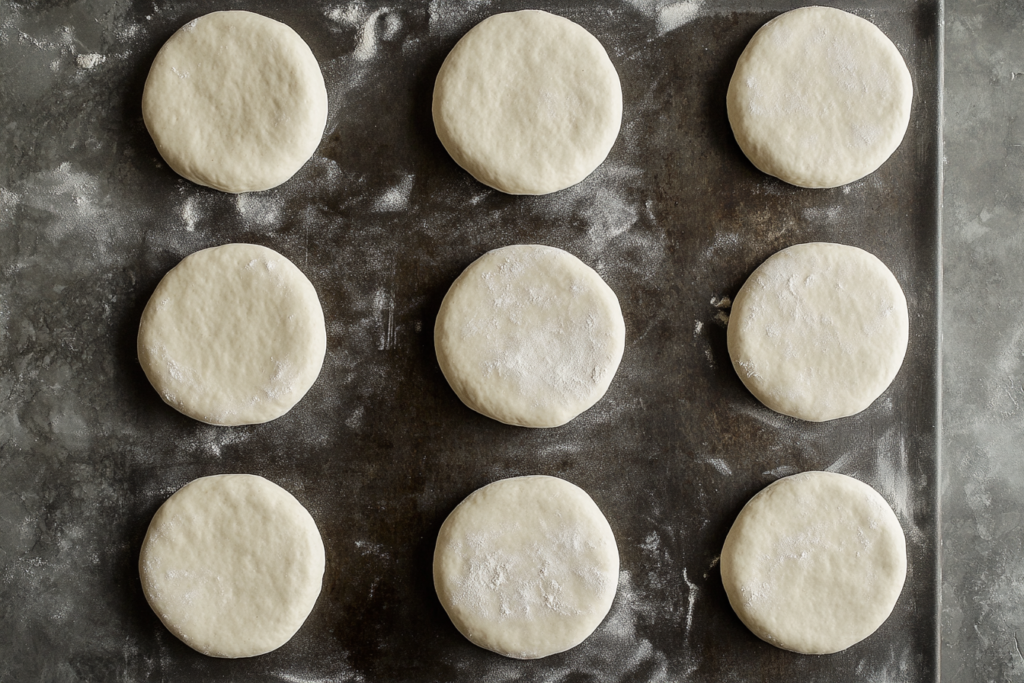
- Divide the Dough: Punch the risen dough into equal portions, typically 8–10 for standard-sized buns.
- Shape the Buns: Roll each portion into a ball and flatten slightly to form a bun shape. Place the buns on a parchment-lined baking sheet, leaving enough space for expansion.
- Final Proof: Cover the buns with a clean kitchen towel and allow them to proof for another 1–2 hours until they’ve puffed up significantly.
Baking Tips for the Perfect Bun
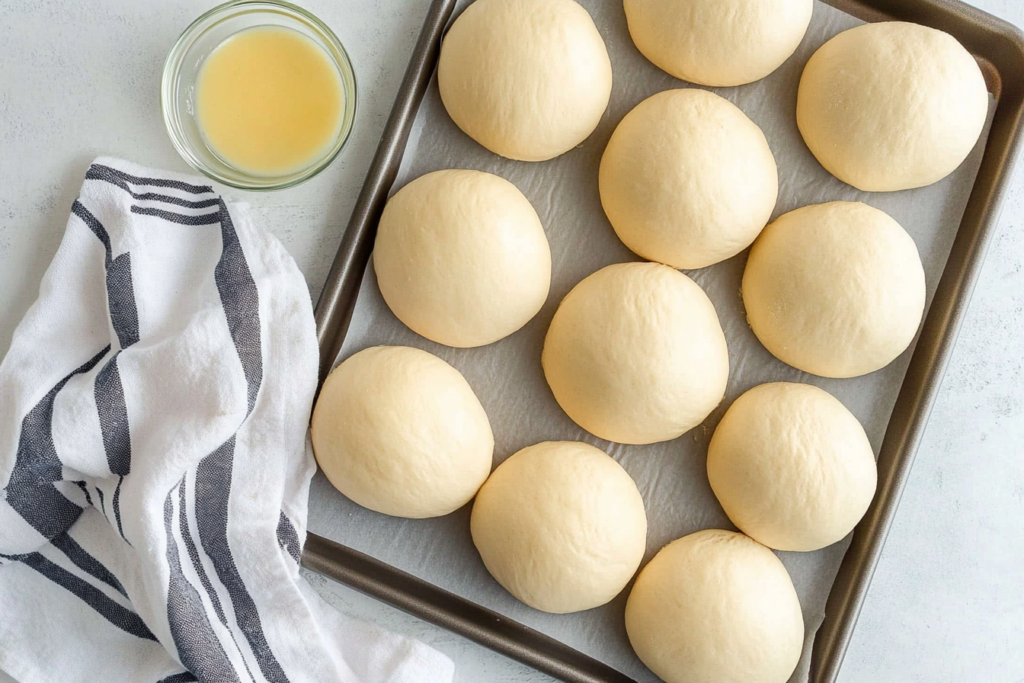
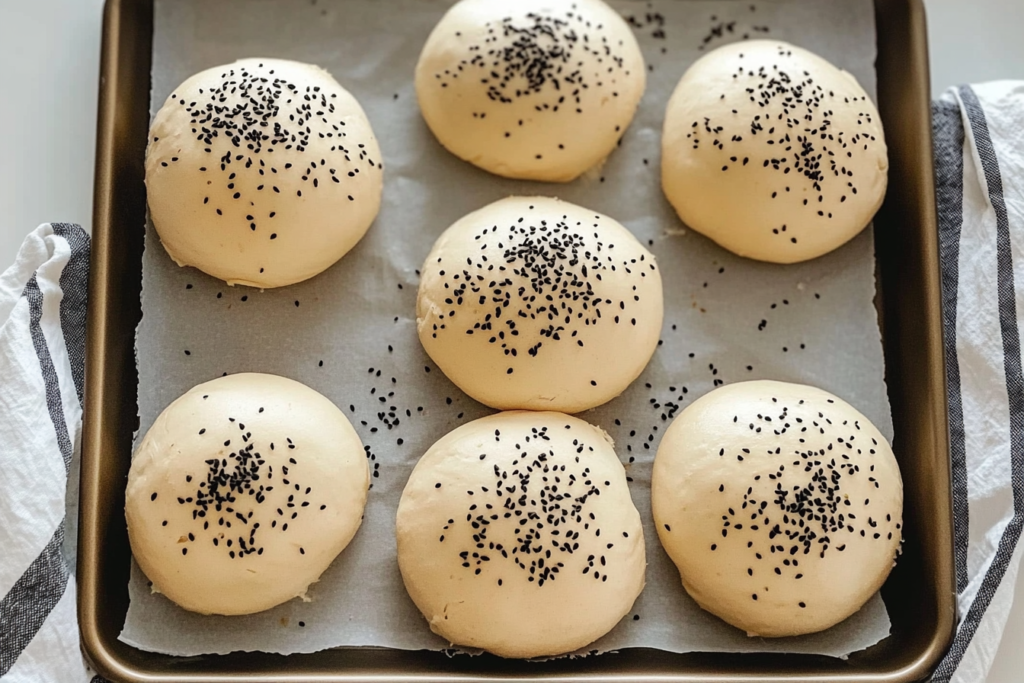
- Preheat the Oven: Set your oven to 375°F (190°C) and place a rack in the center.
- Egg Wash for Shine: Brush the tops of the buns with an egg wash (a mixture of beaten egg and water or milk) to create a glossy, golden crust.
- Bake Until Golden: Bake the buns for 15–20 minutes, rotating the baking sheet halfway through for even cooking. They’re ready once the tops are golden brown, and the buns sound hollow when tapped.
Tips for Enhancing Sourdough Discard Hamburger Buns
Making sourdough discard hamburger buns is a great way to upcycle your discard, but a few creative tweaks can further elevate your buns. Whether you want to experiment with toppings or improve their longevity, these tips will take your baking to the next level.
Adding Seeds and Toppings
Why settle for plain buns when you can jazz them with a sprinkle of seeds or other toppings? Popular choices include sesame seeds, poppy seeds, or even coarse sea salt for an artisanal touch. To ensure the toppings stick, brush the buns with an egg wash before sprinkling them.
Mix herbs like rosemary or garlic powder into the dough for a bolder flavor. You’ll end up with buns as flavorful as the burger filling they cradle.
Customizing Bun Sizes and Shapes
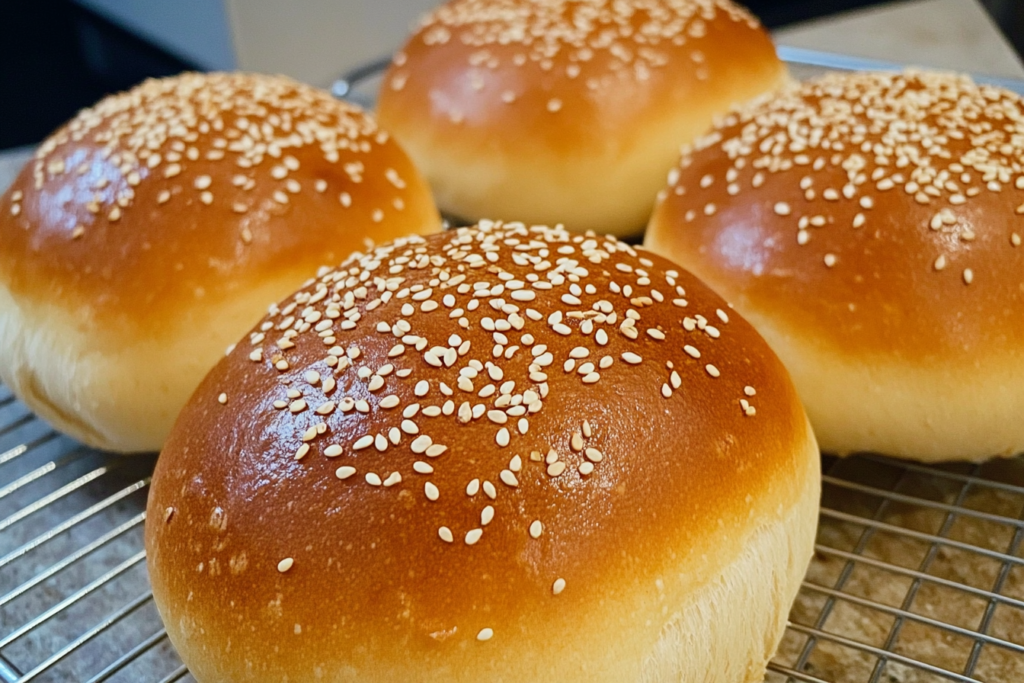
Want sliders or oversized buns for hearty gourmet burgers? Adjusting the size of your dough portions is as simple as dividing it into smaller or larger pieces. Consider braiding the dough for unique shapes or using a muffin tin for uniform, dome-shaped buns. The options are endless!
Storing Buns for Longer Shelf Life
Fresh buns are always best, but you must sometimes prepare in advance. Store your sourdough buns in an airtight container at room temperature for up to two days. For longer storage, consider freezing, which we’ll cover in the next section. To restore freshness, lightly toast or steam the buns before serving.
How to Freeze Sourdough Discard Hamburger Buns
Freezing is a fantastic way to extend the shelf life of your sourdough discard hamburger buns, especially if you’ve made a big batch. With proper techniques, you can enjoy fresh-tasting buns weeks after baking.
Best Practices for Freezing
- Cool Completely: Ensure the buns are fully cooled before freezing to prevent condensation, which can lead to freezer burn.
- Wrap Individually: Wrap each bun tightly in plastic wrap or aluminum foil, preventing them from sticking together and allowing you to thaw only as many as you need.
- Use Freezer Bags: Place the individually wrapped buns into a resealable freezer bag. Squeeze out as much air as possible to keep them fresh for up to three months.
For a detailed guide on freezing bread, check out Best Practices for Freezing Bread.
Reheating Frozen Buns
Reheating frozen buns can be done in various ways, depending on your preference. The oven works best for retaining texture. Preheat to 350°F (175°C), wrap the buns in foil, and warm them for 10–15 minutes. Alternatively, microwave them in 15-second increments, which may result in softer crusts.
To maintain their texture, avoid over-toasting or over-steaming, as this can make the buns too crispy or overly moist.
Alternative Uses for Sourdough Discard
If you’re exploring creative ways to use your sourdough discard, hamburger buns aren’t the only option. This versatile ingredient can be transformed into various delicious baked goods that will delight your taste buds. From breakfast to dessert, sourdough discard is a true multitasker in the kitchen.
Sourdough Pancakes and Waffles
Start your day with fluffy sourdough pancakes or crispy waffles. By using sourdough discard as the base, you’ll achieve a tangy flavor that complements syrups, fruits, or savory toppings. The sourdough’s natural acidity helps tenderize the batter, making these breakfast staples melt-in-your-mouth good.
Flatbreads and Pizza Crust
Flatbreads and pizza crusts are another fantastic way to use sourdough discard. The dough’s tangy flavor pairs wonderfully with toppings like roasted vegetables, cheese, and fresh herbs. Combine your discard with flour, water, and olive oil, then roll it out and cook it on a skillet or bake in the oven.
Desserts: Cakes and Cookies
Yes, you can even bake sweets with sourdough discard! Cakes, cookies, and brownies made with sourdough discard gain a subtle depth of flavor and an incredibly moist texture. For instance, a sourdough chocolate cake offers a delightful balance of sweetness and tanginess, making it a hit at any gathering.
Best Sourdough Hamburger Bun Recipes
Crafting the perfect hamburger bun requires a great recipe as a foundation. Whether you prefer a classic flavor or something more adventurous, these recipes will help you create anything but ordinary buns.
Classic Sourdough Discard Buns
This timeless recipe is a staple for any home baker. You can create soft, flavorful buns that complement any burger by combining sourdough discard with basic ingredients like flour, yeast, sugar, and milk. These buns are slightly chewy on the outside with a pillowy interior—a perfect balance for holding juicy patties.
Brioche-Style Buns with Sourdough Discard
For a richer, buttery flavor, try brioche-style buns. Incorporate eggs and butter into your dough to achieve that signature soft, fluffy texture. These buns are ideal for gourmet burgers or even as a base for breakfast sandwiches.
Whole Wheat Sourdough Buns
Health-conscious bakers will love this variation. You’ll create higher fiber and nutrient buns by substituting part or all of the white flour with whole wheat flour. The sourdough discard enhances the earthy flavor of the whole wheat, resulting in a hearty bun that’s both delicious and nutritious.
For expert tips on sourdough starter maintenance, visit Sourdough Starter Tip
FAQs About Sourdough Discard and Hamburger Buns
When it comes to sourdough discard hamburger buns, home bakers frequently ask plenty of questions. Below, you’ll find answers to some of the most common queries, including tips for using discard in other recipes, freezing buns, and enhancing their flavor.
What is the best way to freeze hamburger buns?
Freezing hamburger buns is easy and ensures you always have fresh buns on hand. The best method is to wrap each cooled bun individually in plastic wrap or aluminum foil. Then, place the wrapped buns into a freezer-safe bag, removing as much air as possible before sealing. This method keeps buns fresh for up to three months. To reheat, thaw at room temperature or warm in an oven preheated to 350°F (175°C) for 10–15 minutes.
Can I use sourdough discard for other bread recipes?
Absolutely! Sourdough discard is incredibly versatile and can be used in recipes like sandwich loaves, dinner rolls, and focaccia. Its tangy flavor enhances the taste of any bread, and it works well in both yeasted and non-yeasted recipes. For recipes requiring a rise, you may need to add commercial yeast for additional leavening power.
How does sourdough discard improve bun texture?
Sourdough discard contributes to a softer and more tender texture by retaining moisture in the dough. Its acidity also strengthens the gluten structure, creating airy and sturdy buns to hold burger toppings without falling apart.
What toppings pair best with sourdough hamburger buns?
Sourdough hamburger buns are a blank canvas for creative toppings. Classic choices like sesame seeds or poppy seeds add texture and flavor, while coarse salt or even Everything Bagel seasoning can offer a gourmet touch. Try brushing the buns with honey butter right after baking for sweet applications.
Can I make buns without additional yeast?
Yes, relying solely on the natural fermentation from the sourdough discard is possible. However, the process will take much longer, as the discard needs time to leaven the dough. If you have the patience, the result is a bun with a deeper flavor and a slightly chewier texture.

